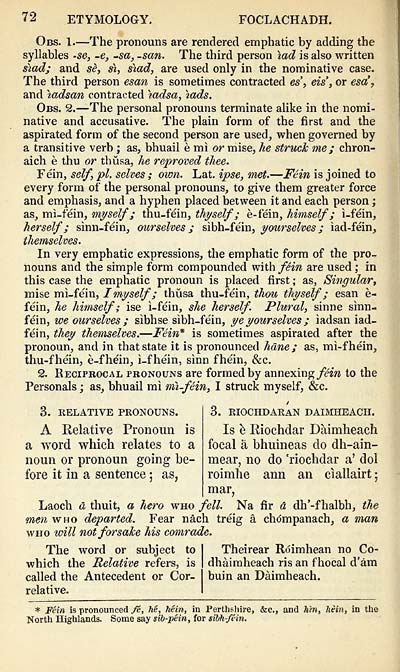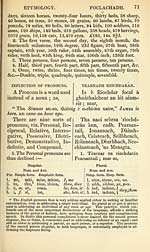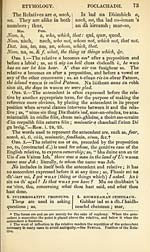Books and other items printed in Gaelic from 1841 to 1870 > Stéidhean a' Ghràmair Ghaëlig
(100) Page 72
Download files
Complete book:
Individual page:
Thumbnail gallery: Grid view | List view

72 ETYMOLOGY. FOCLACHADH.
Obs. I. — The pronouns are rendered emphatic by adding the
syllables -se, -e, -sa, -san. The third person \ad is also written
siad; and sè, sì, sìad, are used only in the nominative case.
The third person esan is sometimes contracted es', eis', or esa',
and ìadsan contracted tadsa, ìads.
Obs. 2. — The personal pronouns terminate alike in the nomi-
native and accusative. The plain form of the flrst and the
aspirated form of the second person are used, when governed by
a transitive verb ; as, bhuail è mì or mise, lie strucìc me ; chron-
aich è thu or thùsa, he reproved thee.
Fèin, self, pl. selves ; own. Lat. ipse, met. — Fèin is joined to
every form of the personal pronouns, to give them greater force
and emphasis, and a hyphen placed between it and each person ;
as, mì-fèin, myself ; thu-fèin, ihyself ; è-fèin, himself; ì-fèin,
herself; sìnn-fèin, ourselves ; sìbh-fèin, yourselves ; ìad-fèin,
In very emphatic expressions, the emphatìc form of the pro-
nouns and the simple form compounded with fèin are used ; in
this case the emphatic pronoun is placed flrst ; as, Singular,
mise mì-fèin, Imyself ; thùsa thu-fèin, thou thyself ; esan è-
fèin, he himself; ise ì-fèin, she herself. Plural, sinne sìnn-
fèin, we ourselves ; sìbhse sìbh-fèin, ye yourselves ; ìadsan iad-
fèin, they themselves. — Fèin* is sometimes aspirated after the
pronoun, and in thatstate it is pronounced hàne ; as, mì-fhèin,
thu-fhèin, è-fhèin, ì-fhèin, sìnn fhèin, &c.
2. Reciprocal pronouns are formedby annexing/ezw to the
Personals ; as, bhuail mì mi-fèin, I struck myself, &c.
3. RELATIVE PRONOUNS.
A Eelative Pronoun is
a word which relates to a
noun or pronoun going be-
fore it in a sentence ; as,
3. RIOCHDARAN DAIMHEACH.
Is è Riochdar Dàimheach
focal à bhuineas do dh-ain-
mear, no do riochdar a' dol
roimhe ann an cìallairt;
mar,
Laoch à thuit, a hero who fell. Na fìr à dh'-f halbh, the
men who departed. Fear nàch trèig à chdmpanach, a man
who will notforsahe his comrade.
The word or subject to I Theirear Rdimhean no Co-
which the Belative refers, is | dhàimheach ris an f hocal d'àm
called the Antecedent or Cor- | buin an Dàimheach.
relative.
* Fèin is pronounced fè, kè, hèin, in Perthshire, &c, and ìiìn, htin, in the
North Highlands. Some say sib-pèin, for sibh-fèin.
Obs. I. — The pronouns are rendered emphatic by adding the
syllables -se, -e, -sa, -san. The third person \ad is also written
siad; and sè, sì, sìad, are used only in the nominative case.
The third person esan is sometimes contracted es', eis', or esa',
and ìadsan contracted tadsa, ìads.
Obs. 2. — The personal pronouns terminate alike in the nomi-
native and accusative. The plain form of the flrst and the
aspirated form of the second person are used, when governed by
a transitive verb ; as, bhuail è mì or mise, lie strucìc me ; chron-
aich è thu or thùsa, he reproved thee.
Fèin, self, pl. selves ; own. Lat. ipse, met. — Fèin is joined to
every form of the personal pronouns, to give them greater force
and emphasis, and a hyphen placed between it and each person ;
as, mì-fèin, myself ; thu-fèin, ihyself ; è-fèin, himself; ì-fèin,
herself; sìnn-fèin, ourselves ; sìbh-fèin, yourselves ; ìad-fèin,
In very emphatic expressions, the emphatìc form of the pro-
nouns and the simple form compounded with fèin are used ; in
this case the emphatic pronoun is placed flrst ; as, Singular,
mise mì-fèin, Imyself ; thùsa thu-fèin, thou thyself ; esan è-
fèin, he himself; ise ì-fèin, she herself. Plural, sinne sìnn-
fèin, we ourselves ; sìbhse sìbh-fèin, ye yourselves ; ìadsan iad-
fèin, they themselves. — Fèin* is sometimes aspirated after the
pronoun, and in thatstate it is pronounced hàne ; as, mì-fhèin,
thu-fhèin, è-fhèin, ì-fhèin, sìnn fhèin, &c.
2. Reciprocal pronouns are formedby annexing/ezw to the
Personals ; as, bhuail mì mi-fèin, I struck myself, &c.
3. RELATIVE PRONOUNS.
A Eelative Pronoun is
a word which relates to a
noun or pronoun going be-
fore it in a sentence ; as,
3. RIOCHDARAN DAIMHEACH.
Is è Riochdar Dàimheach
focal à bhuineas do dh-ain-
mear, no do riochdar a' dol
roimhe ann an cìallairt;
mar,
Laoch à thuit, a hero who fell. Na fìr à dh'-f halbh, the
men who departed. Fear nàch trèig à chdmpanach, a man
who will notforsahe his comrade.
The word or subject to I Theirear Rdimhean no Co-
which the Belative refers, is | dhàimheach ris an f hocal d'àm
called the Antecedent or Cor- | buin an Dàimheach.
relative.
* Fèin is pronounced fè, kè, hèin, in Perthshire, &c, and ìiìn, htin, in the
North Highlands. Some say sib-pèin, for sibh-fèin.
Set display mode to:
![]() Universal Viewer |
Universal Viewer | ![]() Mirador |
Large image | Transcription
Mirador |
Large image | Transcription
Images and transcriptions on this page, including medium image downloads, may be used under the Creative Commons Attribution 4.0 International Licence unless otherwise stated. ![]()
| Rare items in Gaelic > Books and other items printed in Gaelic from 1841 to 1870 > Stéidhean a' Ghràmair Ghaëlig > (100) Page 72 |
|---|
| Permanent URL | https://digital.nls.uk/101712799 |
|---|
| Description | Out-of-copyright books printed in Gaelic between 1631 and 1900. Also some pamphlets and chapbooks. Includes poetry and songs, religious books such as catechisms and hymns, and different editions of the Bible and the Psalms. Also includes the second book ever published in Gaelic in 1631. |
|---|

